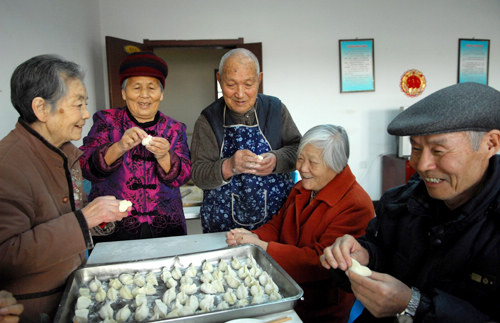|
 |
|
VETERAN COOKS: Residents of a nursing home in Wuhai, Inner Mongolia Autonomous Region, make dumplings on the eve of China's Lunar New Year on January 22 (ZHANG CHAOQUN) |
"Our population structure makes it inevitable that caring for the elderly will become an enormous social burden. For the next two decades, a growing proportion of elderly people will have just one child, which means that each young couple has to take care of four elderly parents while raising their own children and having a career," said You Jiangyun, Doctor of Medicine.
According to You, facilities at China's nursing homes are insufficient to cope with the inevitable demand, and there aren't enough qualified caregivers in the country.
"It is an urgent social task to raise the general level of care for the elderly," You told Science and Technology Daily.
According to a recent survey conducted by The Beijing News of 1,231 respondents, 87.2 percent are not satisfied with the benefits and services enjoyed by the elderly. About 81.4 percent of respondents cited insufficient government investment as the main cause of the present situation and 74.6 percent complained that there were too few public nursing homes.
Yao Yuan, a professor of School of Sociology and Population Studies of Renmin University, told People's Daily that the government should increase its subsidies to private nursing homes to allow them to lower their prices.
Huichen Seniors Community is the first public nursing home in Beijing that was built by the government and is managed by a bid winning company. Zhou Liming, general manager of this facility, said that more facilities should be established along public-private lines to avoid conflicts over land and offer lower prices to potential residents.
You is a physician as well as one of the main designers of China's first online hospital mainly targeted at the elderly, which was launched in Beijing in April.
Elderly Web surfers can register as members and create their digital medical records and consult a geriatrician 24 hours a day via webcam, online chat or email after paying fees. A terminal downloaded to cell phones enables elderly users to report physical discomfort immediately to a family doctor appointed by the website through a video chat and the doctor will appoint a face-to-face check-up if necessary.
The online hospital, which has access to the medical resources of specialists and veteran geriatricians from large research hospitals, also provides long-distance training for staff of nursing homes. Specialists and geriatricians can also conduct live tele-consultations with nursing home residents and seniors who live at home on this platform. Such services are free of charge for poor senior citizens in rural areas.
"By launching this website, we expect to dramatically boost the occupancy rates of nursing homes and improve the medical care enjoyed by elderly people living at their homes while alleviating burdens of their children," said You.
In Shanghai, Zhang Jun, a young man returning to his home city after studying in Japan, has found a niche market in providing medical-related care to middle-income elderly people. Setting up a company of 10 people, Zhang now hires one general practitioner, who assesses the general health conditions for clients, and eight nurses and therapists. Zhang expects his caregivers to be in the middle between domestic helpers and professional nurses in terms of medical knowledge and know how to prevent bed sores for bedridden patients, exercise facial muscles for those with difficulty in swallowing to prevent choking and measure blood pressure.
He discovered this business opportunity when he saw that many elderly people chose to stay in crowded hospital wards when it was clear that they really needed long-term care.
Although Zhang's clients are charged 60 yuan ($9.5) to 120 yuan ($19) per hour for the care, considerably higher than regular maid services, the company still struggles to make ends meet.
"If basic medical insurance can cover some of the home care items we provide, I am sure we will have more customers," Zhang told Xinmin Evening News.
Another development hurdle identified by Zhang is how to attract young people to join him. The average age of Zhang's employees is above 40 years. "Domestic caretaker for the elderly is not a recognized profession, which impedes young people's participation in this industry. I hope with the accelerated population aging in China this could change in the near future," Zhang said.
Email us at: lili@bjreview.com | 